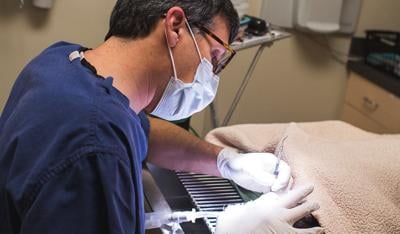(Published June 30, 2019)
By Elisa Shoenberger
Staff writer
Most people know they need to take care of their own teeth but few realize dogs and cats also need dental care.
“If we don’t brush our teeth for a day, we get that film on our teeth, that film is plaque,” explained Dr. Jennifer Stecher of Good Vets, 227 E. Grand Ave. “If an animal doesn’t their brush teeth, they naturally create plaque. In time that plaque forms into tartar.”
In addition to tartar being bad for a dog’s teeth, it’s bad for the rest of the animal as well.
“Any time we have animals that have periodontal disease, everytime that animal swallows, that means the bacteria is going from (their) mouth into their stomach,” Stecher said. That can cause gastrointestinal issues or even affect other organs such as the heart, kidney and liver.
Stecher recommends brushing a pet’s teeth at least every other day.
“Brushing is the best thing you can do for your dog and cat at home,” said Dr Gonsky of West Loop Veterinary Care, 815 W. Randolph. “Most dogs and cats can be trained to accept toothbrushing very well, and can look forward to it.”
West Loop Veterinary Care is working on a video to help pet owners learn how to brush their pets’ teeth.
While there are numerous products available, such as dental chews, Stecher said they are not a replacement for tooth brushing. Dental chews may not reach all the teeth since animals tend to favor one side of the mouth for chewing, she said.
In addition to brushing teeth, both doctors recommend having the pet’s teeth examined by a veterinarian. A veterinarian can help advise the owner decide the best course of action for their pet’s dental well being.
Full dental procedures, necessary to properly clean the gum line, polish teeth and get X-rays, require the animal to have anesthesia, Stecher said.
“it’s more dangerous when they are fully awake,” she said. “It’s the safest way to do a dental procedure.”
“I think pet owners need to know that their pets’ oral health is as important as their skin health, joint health or any other system in their body,” Gonsky said. “Our pets don’t have the capacity to tell us and the signs of discomfort may be very subtle. Regular communication and examination with the vet is the key to helping keep your whole dog or cat and their mouth healthy.”
Photo credit: Krista Scarlavai








(0) comments
Welcome to the discussion.
Log In
Keep it Clean. Please avoid obscene, vulgar, lewd, racist or sexually-oriented language.
PLEASE TURN OFF YOUR CAPS LOCK.
Don't Threaten. Threats of harming another person will not be tolerated.
Be Truthful. Don't knowingly lie about anyone or anything.
Be Nice. No racism, sexism or any sort of -ism that is degrading to another person.
Be Proactive. Use the 'Report' link on each comment to let us know of abusive posts.
Share with Us. We'd love to hear eyewitness accounts, the history behind an article.